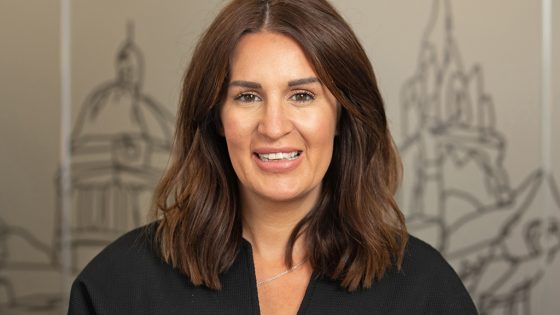Beth Bundonis is regional managing director at Lovell Partnerships
This week is Women in Construction Week. Dating back to 1953, it has maintained a singular goal: to strengthen and amplify the success of women in the construction industry. Since it was first established, there’s no question that the industry has made huge strides in terms of gender representation, but Women in Construction Week’s continued existence shows that we still have a way to go to achieve true equality.
“No matter what our gender, we rise by lifting others, so a collaborative approach to leadership came naturally to me”
When I was preparing to leave school, it was assumed that if you were academic or got good grades, going to university full-time was your only option. Degree apprenticeships, vocational qualifications or work placements weren’t mentioned, so I took the only route that I thought was available to me and started studying for a degree.
Quickly realising that this wasn’t the right path for me, I started thinking about my skillset. I’d always been good at maths but didn’t feel like traditional paths such as accountancy were a good fit. A family friend suggested that I might make a good quantity surveyor, as I liked being out and about and meeting new people. I applied for a traineeship at Lovell and over 20 years later, here we are!
Changing times
Having worked my way up within the business, I’ve seen so many changes in the industry since I started. During my first few years on site, more often than not there wasn’t even a female toilet. Now that is a bare minimum requirement.
That’s not to say that there haven’t been challenges. The biggest one for me was when I took on my current role as regional managing director, tasked with setting up and leading Lovell’s East Midlands operation. Within the industry, women don’t see themselves represented at a senior level, and that was something I was acutely aware of while developing my own leadership style.
I’ve been very lucky to have been supported by Lovell at all stages of my career, but I still felt an internalised pressure to not only prove myself as a leader within the business, but also to the wider industry. Without reducing leadership styles to harmful “male vs female” stereotypes, I think this acknowledgement of myself as a role model has definitely had an effect on how I engage with the team.
Becoming a mother in 2016 also had a huge impact on how I saw myself as a leader. I became a lot more patient and more likely to consider different ways of approaching a problem. Ultimately, I believe that no matter what our gender, we rise by lifting others, so a collaborative approach to leadership came naturally to me.
While I’m not new to the industry, I think my experience as someone who’s not been historically as well-represented within it has also made me more likely to take a chance on people during the hiring process. I’m a firm believer that just because something is the way we’ve always done it, it doesn’t mean that it’s always the best way. Luckily, I’m not alone in this. I think part of why I’ve stayed within Lovell for so long has been because of its drive for continued progress when it comes to equality and diversity.
As well as driving this progress internally, we need to look to stakeholders and the supply chain to ensure we’re not operating in a vacuum. While the education sector has started to respond to the practical needs of key sectors, with skills shortages on the increase, early-stage engagement with schools is crucial. Young women need to see themselves reflected, not just at senior levels, but across all manner of roles – from bricklaying to customer care to architecture. More also needs to be done across the board to retain female staff, whether through gender equality training, promoting flexible working patterns or collaboration with industry associations.
As an industry, we know that we’re still a work in progress. However, at Lovell there’s a company-wide acknowledgement that while we might not have all of the answers all of the time, we’re committed to learning and doing what’s right by our people and customers. And it’s only through this attitude of admitting when we’ve not quite got it right, or where we need to be better, that we can truly challenge preconceptions of the construction sector and ensure it is reflective of everyone that it needs to represent.
Information on this year’s Inspiring Women in Construction & Engineering Conference & Awards – hosted by Construction News and sister titles New Civil Engineer and Ground Engineering – can be found here

